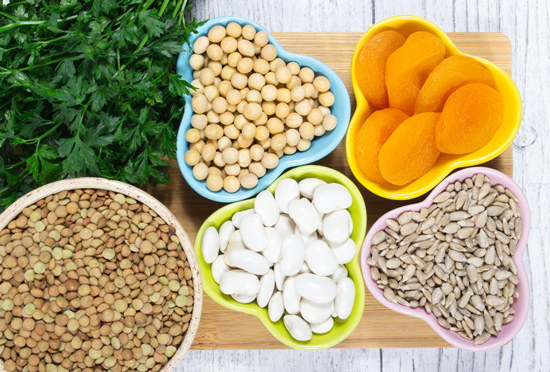About The Buzz: Vegetarians Have Higher Rates of Anemia?

WHAT THEY’RE SAYING
New research demonstrates that vegetarian women have much higher rates of iron deficiency anemia than their non-vegetarian counterparts.
ABOUT THE STUDY
A new study, published in the Journal of Nutrition and Food Science, explores nutritional status and overall health status of vegetarian and non-vegetarian women.1 The study included 30 vegetarian and 30 non-vegetarian women, between the ages of 20-40 years. Women who smoked, were pregnant, took vitamin or mineral supplements or took any medications were excluded from the study. Information on educational status, religion, living status and social status were collected, in addition to anthropometric measures of height, weight and body mass index (BMI). BMI is a tool that uses height and weight to estimate an individual’s percentage of body fat to muscle ratio; a BMI of 18.5-24.9 is considered optimal. BMI over 25 is considered over weight and a BMI over 30 is considered obese. Dietary information was collected based on 24-hour dietary recall surveys.
RESULTS OF THE STUDY
Vegetarian women had significantly lower BMIs than meat eaters: the average BMI for vegetarians was 25.66 and 28.28 in non-vegetarians. However, all vegetarian women had some degree of iron deficiency anemia – 60% were mildly anemic and 40% were moderately anemic. Non-vegetarians experienced far less iron deficiency anemia, with 47% mildly anemic and only 7% moderately anemic.
WHY THIS MATTERS
Iron deficiency anemia is a condition that occurs when the blood lacks sufficient healthy red blood cells.2 The condition is problematic because red blood cells carry oxygenated blood to the body’s tissues. Without adequate iron, the body isn’t able to create enough haemoglobin, the substance that enables red blood cells to carry oxygen to the cell’s tissues. Symptoms of iron deficiency anemia include fatigue, shortness of breath, fast heartbeat, pale skin, weakness, headache, cold hands and feet, poor appetite, brittle nails and chest pain.2 Iron deficiency anemia can result from blood loss, pregnancy, lack of iron from the diet or poor iron absorption.
The World Health Organization (WHO) reports that iron deficiency anemia is the most prevalent nutritional deficiency worldwide, effecting nearly 25% of individuals globally, or 1.62 billion people.1 The deficiency is most pervasive in developing countries and more heavily impacts women and children than men – 47% of preschool age children and 42% of pregnant women are iron deficient.
THE BOTTOM LINE
In order to ensure adequate dietary iron intake, vegetarians must intentionally seek out iron-rich foods and consider nutritional supplements. The richest sources of dietary iron for non-vegetarians are found in meat and poultry. For vegetarians, the top sources of iron-rich foods include lentils, kidney beans, tofu, spinach, fortified breakfast cereals, bread, kale, cabbage, broccoli, dried fruit such as raisins, dates and apricots, and almonds and cashews.3
OUR ADVICE
Individuals may choose to refrain from eating meat for a variety of cultural, religious, health or financial reasons and still maintain a healthy lifestyle free of unintended nutritional deficiencies. A carefully planned vegetarian or vegan diet can meet all nutritional needs for each stage of the lifespan, from infancy through older adulthood. Before undertaking any new diet, be sure to speak with your primary care physician or a registered dietitian to ensure your new diet will meet your specific nutritional needs. Prepare for that meeting by conducting research beforehand to make the most of your time with a professional by asking in-depth, specific questions.
More Info
Iron in the Vegan Diet (great resource for vegans and vegetarians alike!)
Are You Getting Enough Iron?
Iron Dietary Supplement Fact Sheet
Best Fruit or Veggie Sources Of Iron
Video Center: Selection. Storage. Preparation.
How Many Cups Do You Need?
Key Nutrients in Fruits & Vegetables
Fruit & Veggie Database


